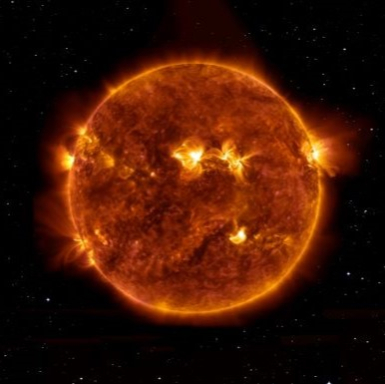BACKGROUND
Space weather is defined as the physical and phenomenological state of natural space environments. Observation, monitoring, analysis and modelling of the state of the Sun and interplanetary and planetary environments (both via space- and ground-based observations) help us to understand its state and the possible impacts on Earth.
There are several mechanisms of action (and concern) related to space weather impacts on humanity and Earth-based industries. These include the induction of geomagnetically-induced currents (GIC) in terrestrial conductors, fluctuations in Earth’s magnetic field as measured by instruments on the ground, modifications to radio signal propagation characteristics and associated ground-based and satellite services, changes to atmospheric drag that can disrupt a satellite’s orbit and orientation, and space radiation risks to spacecraft and aircraft components and the well-being of aircrew, passengers and space-farers.
From this, the most relevant industrial sectors which would potentially benefit from the monitoring, assessment and prediction of space weather impacts on various infrastructure, are as follows:
- Electricity Networks – power infrastructure due to their susceptibility to disruption from GICs.
- Natural Resource Pipelines – GICs are expected to both impact the efficacy of the cathodic protection systems used to prevent corrosion along pipelines and interfere with the manual surveys carried out to monitor their function.
- Aviation – high-latitude and polar flights are thought to be susceptible to space weather impacts on radio communications, satellite navigation system errors and radiation hazards to humans and avionics.
- Railway – though less documented, historical evidence suggests that rail networks may be susceptible to space weather impacts on systems and components in rail infrastructure.
- Resource exploration - Magnetometer surveys are used to identify mineral deposits in the Earth’s crust, for which measurements can be altered due to space weather events. Likewise, deep sea drilling operations rely on the Earth's horizontal magnetic field for navigation, which can be impacted by space weather events.
The purpose of this Invitation to Tender is to support industry in assessing the technical and economic viability of commercial services that leverage space weather data in a subset of the above domains (and/or alternatives adequately justified by industry).
VALUE OF SPACE
Various datasets are available for use to such ends, the selection dependent on the given use-case. Sources of near-real time space environment data include ESA’s Space Safety Programme and NOAA (National Oceanic and Atmospheric Administration). For monitoring changes to the ionosphere, data can be sourced from GNSS-RO (GNSS Radio Occultation) satellites that probe the Earth’s atmosphere using incident GNSS signals, from public and private providers. Ground based networks also provide information well-used in the space weather domain.
For predictive capabilities, solar observation satellites and ground-based observatories offer a wide range of data. Space based observations are available via e.g. NASA, NOAA and ESA, while ground based observatories/measurement networks are typically operated locally by individual (groups of) institutes. ESA’s space weather portal brings together a rich catalogue of measurement data available for the purpose of space weather monitoring and forecast including products based on many ground-based networks and facilities. This includes data available for possible commercial exploitation. However, it should be noted that this is not the case by default and the terms and conditions should be analysed carefully in this regard.
WHAT WE LOOK FOR
We look for promising business ideas addressing topics of relevance or related areas that propose:
- attractive market opportunities, identified customer needs and customer engagement
- commercially-viable service concepts
- technically feasible solutions
- added value of space data or technology
- motivated teams with business, technical, and financial expertise
WHAT WE OFFER
200kEuros (firm fixed price), 100% of total cost.
ESA TENDER INFORMATION
The initiative is open to the submission of proposals for Feasibility Studies.
- Feasibility Studies - which provide the preparatory framework to identify, analyse and define new potentially sustainable services.
HOW TO APPLY
- Register by completing the online questionnaire on esa-star registration (this provides for the minimum ‘light registration’)
- Visit esa-star publications and search for this opportunity to download the official tender documentation. Official documents will include proposal templates, a draft contract, and additional information about this opportunity.
- Write your proposal and obtain a Letter of Support from your National Delegation, if required ( please see Authorisation of Funding section below).
- Submit your proposal via esa-star tendering before the deadline (do not wait until the last minute).
AUTHORISATION OF FUNDING
This opportunity is open to companies that intend to develop space-enabled services and products related, but not restricted, to the topics of relevance outlined above. To be eligible for funding, your team must be based in one of the following countries: Austria, Belgium, Czech Republic, Denmark, Estonia, Finland, France, Germany, Hungary, Ireland, Italy, Lithuania, Luxembourg, the Netherlands, Norway, Poland, Portugal, Romania, Slovenia, Sweden, Switzerland and United Kingdom. Teams can involve non-European entities, but their contribution to the activity cannot be funded by ESA.
Authorisation of Funding letters from the corresponding National Delegations are required as part of the application.



